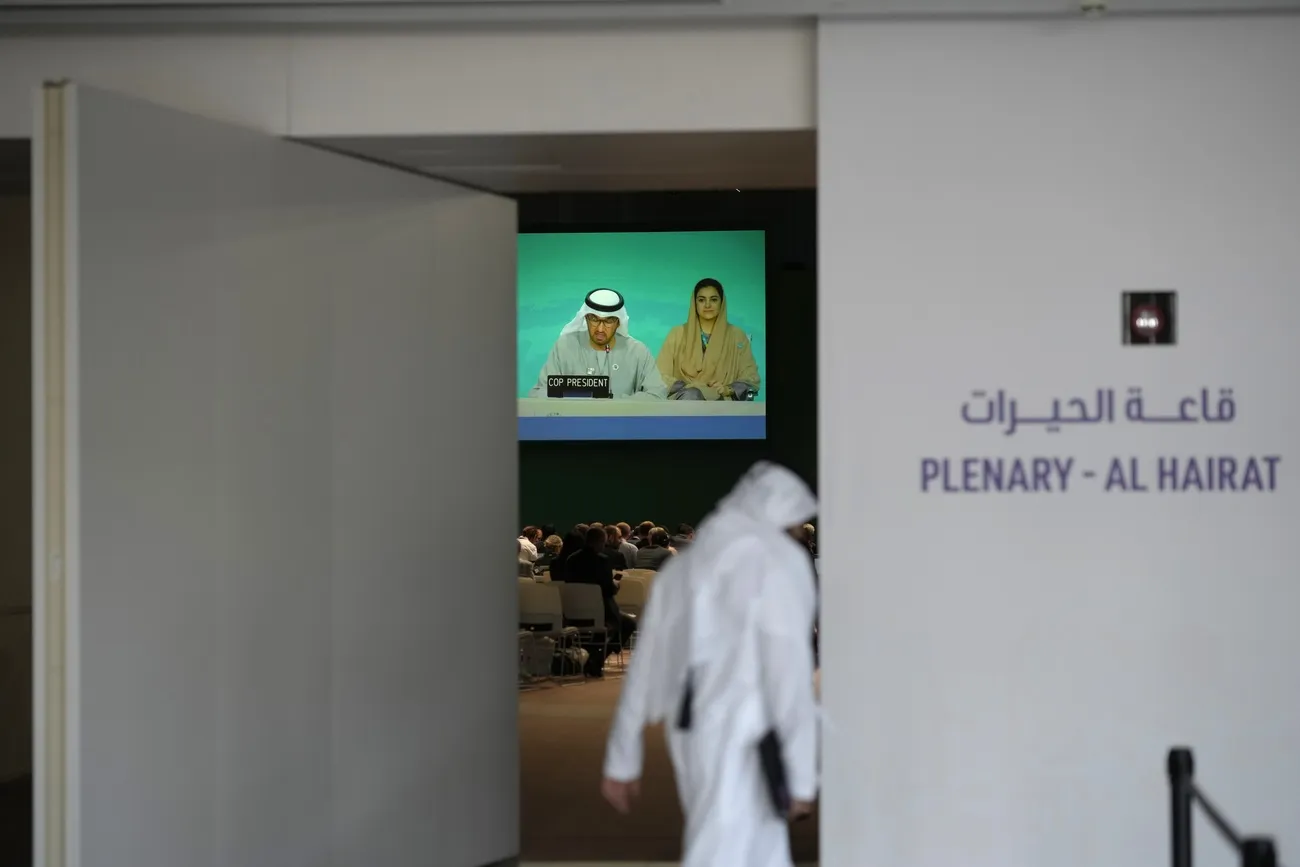What do new rules on carbon offsets mean for dealmaker Switzerland?

Dominated by deep divisions over finance to developing countries and efforts to mitigate global warming, the COP29 climate talks in Baku nonetheless offered a relatively smooth passage for rules on a controversial method to reduce carbon emissions. Switzerland, which is highly reliant on carbon offsets, celebrated the agreement.
Since being introduced in the Paris climate agreement, moves to offset polluting activities with projects that avoid carbon emissions have boomed. Businesses and countries have ploughed ahead to wind up deals – often in developing countries – to offset their CO2 footprints and claim net zero goals. One of the keenest adopters of carbon offsetting has been Switzerland, which to date has concluded about a dozen agreements with other countries, long before some of the technical fine print was gavelled Saturday night at the COP29 in Baku.
What are carbon credits or offsets?
Carbon credits are certificates representing a claim to an amount of carbon emissions that are avoided or removed from the atmosphere. One credit is equivalent to one tonne of CO2 that’s removed or avoided.
These certificates can then be bought and traded among countries and companies to help them compensate for their own carbon emissions and meet their climate targets. They provide a tool for polluters to reduce emissions elsewhere while they transition towards more sustainable modes of operation. Offsetting projects, paid for through the credits, include reforestation efforts, electrification of buses and adoption of sustainable agriculture practices, as well as carbon capture and storage.
What Is Article 6 of the Paris Agreement, and why were new guidelines overdue?
In 2015 in the French capital, countries agreed that credits may be issued in two ways. Article 6.2External link sets that bilateral agreements may allow countries to offset their emissions elsewhere and include them in their climate action plans. Switzerland was an early proponent of this model, having concluded deals with countries including Peru, Ghana, Thailand and Chile.
Article 6.4 of the Paris Agreement allows for public and private entities and companies to offset and trade their emissions. Retailer CoopExternal link, food giant NestléExternal link and the online shop Galaxus are among Swiss companies that have purchased the credits.
Although deals have been made privately and between countries in the years since the Paris climate talks, international guidelines on how these options are implemented were missing until Saturday’s agreements in Baku. Allegations of greenwashing in carbon offsetting programmes by a major Swiss-based carbon credit issuer hit carbon markets hard. Critics complained about a regulatory Wild West and many in the sector were keen to see rules in place to restore trust in the system.

More
Switzerland’s pioneering carbon offsets strategy raises questions
NGOs and climate activists have also raised concerns over bilateral deals. A recent investigationExternal link by Alliance Sud, an association of Swiss relief organisations, found that a bilateral deal between Switzerland and Ghana had overestimated emissions mitigation by nearly 80%. The project involved Switzerland paying for less polluting wood-burning cookstoves to families in Ghana.
In June, a document prepared by a task force convened by UN Secretary General António Guterres recommended that companies refrain from using carbon credits to offset emissions, the Financial TimesExternal link reported.
What’s new for carbon offsetting?
Under the new offsetting system decided in Baku, project developers for agreements not involving a deal between two countries would apply to a United Nations entity, called the Article 6.4 Supervisory Body, to register their projects. The supervisory body and the country where the project will be implemented both have to approve the project before the credits are issued. Projects need to demonstrate social and economic benefits alongside environmental impacts, with a focus on vulnerable populations and upholding human rights.
The UN supervisory body will also be responsible for developing new standards for offsets.
When it comes to Article 6.2, the much-anticipated ‘rulebook’ for offsets between countries leaves it to the governments involved to control and decide what they can issue and authorise as offsets. The offsets issued in the country-to-country deals are known as ITMOs – internationally traded mitigation outcomes.
The highly technical text agreed in Baku says that countries have to publish information about the projects when they approve ITMOs for use by other countries, as well as any inconsistencies in the integrity of the offsets and their verification methods.
Delegates at COP29 approved a registry service for countries unable to afford to set up their own systems to issue and track credits.

What are observers saying?
The private sector and institutions involved in developing and issuing carbon credits welcomed the announcements in Baku, which they felt may help restore trust that had been lost in carbon markets in recent years. Last week, Karolien Casear-Diez, senior director for Article 6 at South Pole, a major carbon offset project developer, predicted that countries engaging in bilateral Article 6.2 agreements may eventually align with 6.4 standards which are comparatively more regulated and structured.
But climate activists and representatives from NGOs were less optimistic. They had already protested the “rushed” process ahead of announcing the carbon market registry in the first week and said that final discussions on Article 6 were again held behind closed doors.
Kelly Stone of the NGO Climate Land Ambition and Rights Alliance, said that the new Article 6.4 guidelines showed how “governments have instead outsourced their responsibilities to ensure human rights and environmental integrity to a handful of people sitting on the Supervisory Body,” while on Article 6.2, she said “the rules lack transparency, risk double counting (of the offsets) and will fail to protect human rights.”
Meanwhile, Erika Lennon, senior climate attorney at Center for International Environmental Law (CIEL), said the agreed bilateral offsetting rules were “worse” than earlier draft proposals.
“There is a lack of accountability in the process that will blow a hole through any integrity that the Paris Agreement has.”
David Knecht, climate expert with the Swiss NGO Fastenaktion, stressed that under the new rules, information about projects is only required when certificates are authorised. As that could come quite late in the process, it could allow inconsistencies to prevail.
He also sees an issue in the cost, particularly for developing countries, of developing standards for trading ITMOs. “If a country like Switzerland already struggles to uphold the standard to a high level, imagine all the developing countries that already have capacity problems.”
What does it mean for Switzerland?
The new rules will consolidate the ability of Switzerland and the countries where it offsets emissions to define the terms of Article 6.4 offset agreements on their own, just as the Alpine country is under pressure to offset nearly double the amount of CO2 emissions that it is currently capable of compensating.
During his short visit to Baku last week, Swiss environment and energy minister Albert Rösti told SWI swissinfo.ch how important offsetting schemes were for the country.
“For Switzerland it is clear, we will need the carbon market to decarbonise our economy for some time.” He offered the example of the air transport industry that will have to rely on credits until “synthetic fuels” are developed.

More
Where the world – and Switzerland – stands on carbon offsets after COP28
Switzerland’s chief climate negotiator, Felix Wertli, was happy with the adoption of Article 6.2 rules after nearly ten years of talks.
“It’s a big deal that we have now finished the Paris rulebook,” he said after they were adopted with long applause. “We have a system that works and is efficient,” he added.
Carbon markets expert Olivier Lejeune said that with the new rules, Switzerland and other developed countries are “expected to expand project-based carbon markets to have an Article 6 ‘stamp’”.
Michael Brennwald, head of international at the Klik Foundation, a group for Swiss motor fuel importers, said he expects the bilateral process to become easier with the new rules. However, aligning regulations in partner countries before implementing projects “will take time”.
He also defended the “very, very tough” social and environmental criteria used by Switzerland in its offset programs.
“Switzerland will never engage in Article 6.2 with a country that questions the integrity of the Paris Agreement conditions,” Brennwald said. “I cannot rule out that other countries may use it differently, but Switzerland will never do that.”
Edited by Veronica DeVore

In compliance with the JTI standards
More: SWI swissinfo.ch certified by the Journalism Trust Initiative









You can find an overview of ongoing debates with our journalists here . Please join us!
If you want to start a conversation about a topic raised in this article or want to report factual errors, email us at english@swissinfo.ch.